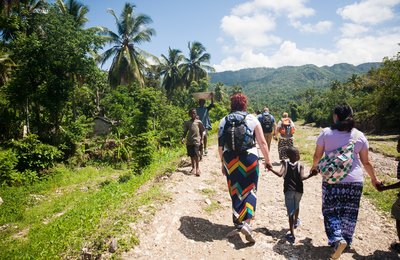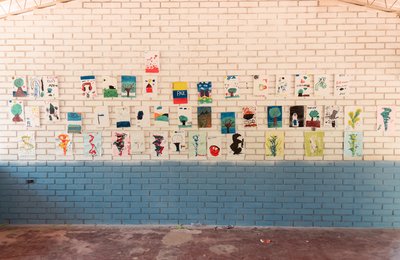Since 2001 Jaffna Social Action Centre (JASC) has been working with the most vulnerable members of society throughout the Jaffna Peninsula and the Northern Province.
During the final stages of Sri Lanka's 26 year conflict JSAC's priority was emergency relief and rehabilitation. Since the end of the war they have moved from responding to crisis situations to strategically addressing deep underlying development problems in post-conflict Sri Lanka.
JSAC focuses on former IDPs (returnees), women-headed families, and children in areas of poverty; implementing projects that will reduce the impact of disaster and trauma, and promote durable development. They work holistically within communities; enabling individuals with knowledge of their self worth and their rights so that they can live a full and valued life. This rights-based approach underpins all their work.
Rebuilding and revitalising communities post-conflict
In 2011, two years after the end of Sri Lanka's civil war, displaced families began to return their villages in the former high security zones. In early 2015 further land was released and more IDPs returned to their place of origin. After decades of neglect the returnee's homes were uninhabitable and nature had reclaimed the land. For many returnees rebuilding their lives is proving difficult, with few jobs or economic opportunities, and little or no savings to call upon.
Shelters and infrastructure
JSAC is working with the communities to provide temporary shelters and WASH: building toilets and renovating wells. They are helping to re-establish the community infrastructure: constructing community centres, and pre-schools, and building the capacities of the CBOs.
Restoring livelihoods
JSAC is working with local CBOs to manage grants and revolving loan systems so that families can acquire the resources they need to re-establish their livelihoods, and so that communities can become independent of donors by having their own development fund.s
Thier grants are usually in the form of resources, for example they gave fishermen fishing livelihood packages (boats, nets etc), the fishermen then repaid 50% of the value of the package into a revolving loan system. With their own boats and proper equipment, many of the fishing families were able to more than double their income.
They are engaged in vocational training projects, particularly for youths, and also work with youths on overcoming childhoods damaged by conflict so that they will be able to envision and plan for an optimistic future.
Protection of women and children
In Sri Lanka's Northern Province, a combination of cultural factors, three decades of conflict, and the post-war scenario have created an environment where violence towards women and children has proliferated, particularly in the returnee communities where families are struggling to rebuild their lives. The trauma of having lived as IDPs, of enduring years of conflict, and of suffering the loss of family and friends can act as an accelerant to an already volatile situation.
Safe House
Since 2003 JSAC has provided a Safe House: an immediately accessible secure place for children and women affected by violence, providing temporary shelter, medical and legal care. The Safe House is a central part of thier multi-sectoral programme for preventing and responding to GBV. Other components include: education and awareness programmes within communities; village based drop-in centres; shelter and livelihood support; co-ordination of the referral agencies and advocacy activities.
Child Protection
JSAC works in communities with parents, children and service providers to set up child protection mechanisms. They establish children's clubs, and organise cultural, creative, and sporting events to bring children together and provide a forum where their voices can be heard.




